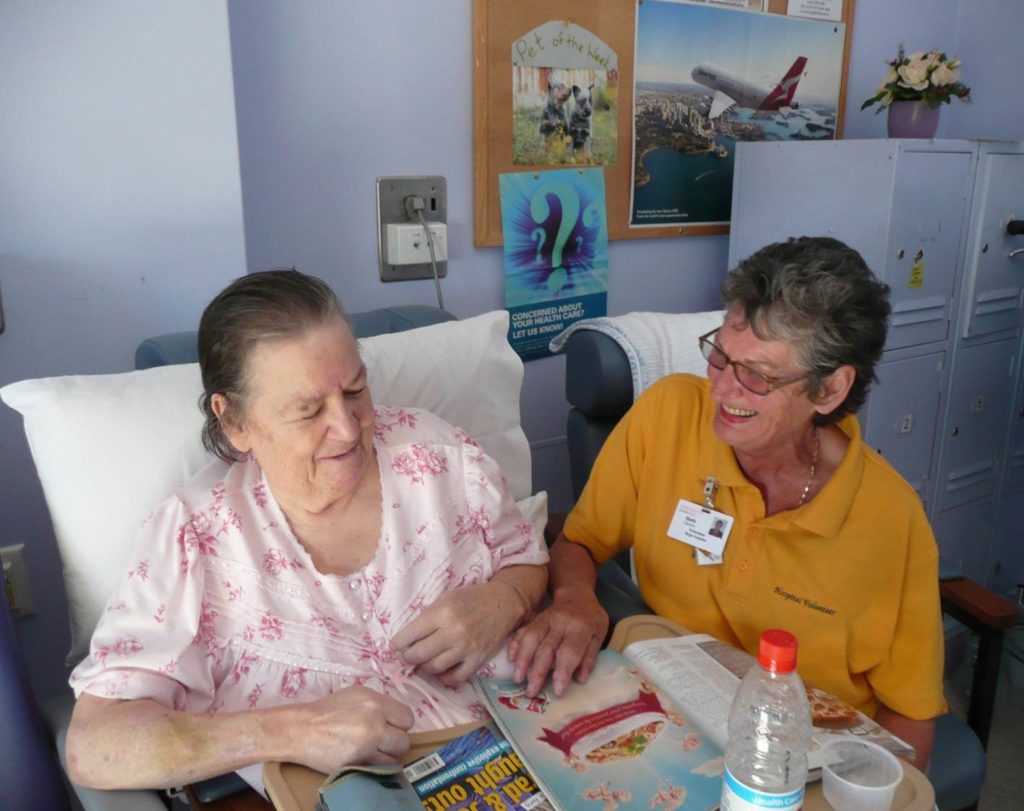Volunteers reducing staff and family care burden
‘“They take a lot of pressure off us”: Volunteers reducing staff and family care burden and contributing to quality of care for older patients with cognitive impairment in rural hospitals’ describes a study that measures whether volunteers trained in person-centred care for older people with dementia or delirium can make a positive difference acute rural hospitals. It also examines the enablers and challenges of the program.
The Volunteer Dementia and Delirium Care program (VDDCP) was originally implemented as a pilot study at one rural hospital in 2009. The NSW Agency for Clinical Innovation subsequently funded the development of a Volunteer Dementia and Delirium Care © Implementation and Training Resource.
The program recruits and trains volunteers to provide person-centred, one-to-one emotional and practical support to reduce risk and improve physical and emotional well-being of the person with dementia and/or delirium. https://www.aci.health.nsw.gov.au/resources/aged-health/confused_hospitalised_older_persons/dementia-and-delirium-care-implementation-training.
Using the resource, the researchers rolled out and further evaluated the program in another seven rural hospitals in the Southern NSW Local Health District with funding from the Commonwealth Department of Health.
It is challenging for hospitals to provide person-centred care for people with cognitive impairment, as by necessity, hospital processes require task orientation and medical focus. This can act as a barrier to responding to the particular care and communication needs of people with cognitive impairment. Added to this is often poor environmental design, time constraints and limited staffing.
Volunteers were recruited through local media and word of mouth and underwent a 2-day group training program on dementia, delirium and person-centred care. This included training in one-to- one practical assistance (eg, assisting with eating, drinking, safe walking, promoting use of visual/hearing aids), therapeutic activities, communication and emotional support for hospitalised patients with dementia and/or delirium. Volunteers were carefully selected and mentored throughout the program. Clear role delineation, staff education and policies and procedures for both volunteers and staff were part of the program implementation.
The evaluation of the program found that the trained volunteers were effective in integrating the key principles of person-centred care.
One patient who was so lonely and she was at quite a high risk for a delirium and she didn’t get a delirium, but she had a volunteer with her doing things, playing cards, reading magazines, talking about things […] She did feedback that it was lovely to have someone with her, listening to her, talking to her and she didn’t feel so isolated. [Manager F013]
Staff and families reported that volunteers reduced the burden on them and offered a low-cost way of improving care.
It takes a lot of pressure off us when they’re setting them up and helping them eat their dinner and stuff like that. We can continue on with our medications and all that. [Staff F064]
I think it just frees up nurses so we can do a better job really. [The volunteers] are invaluable because we can do what we need to do medically, but half the time these people just need someone to talk to. If they have a volunteer talking to them, they’re not on the buzzer every five minutes. [Staff F025]
The nurses were apprehensive about having a patient with dementia and if they had someone [volunteer] to distract him (sic), that was of benefit to them too. [Family 512]
(Authors: Annaliese Blair, Catherine Bateman and Katrina Anderson)


